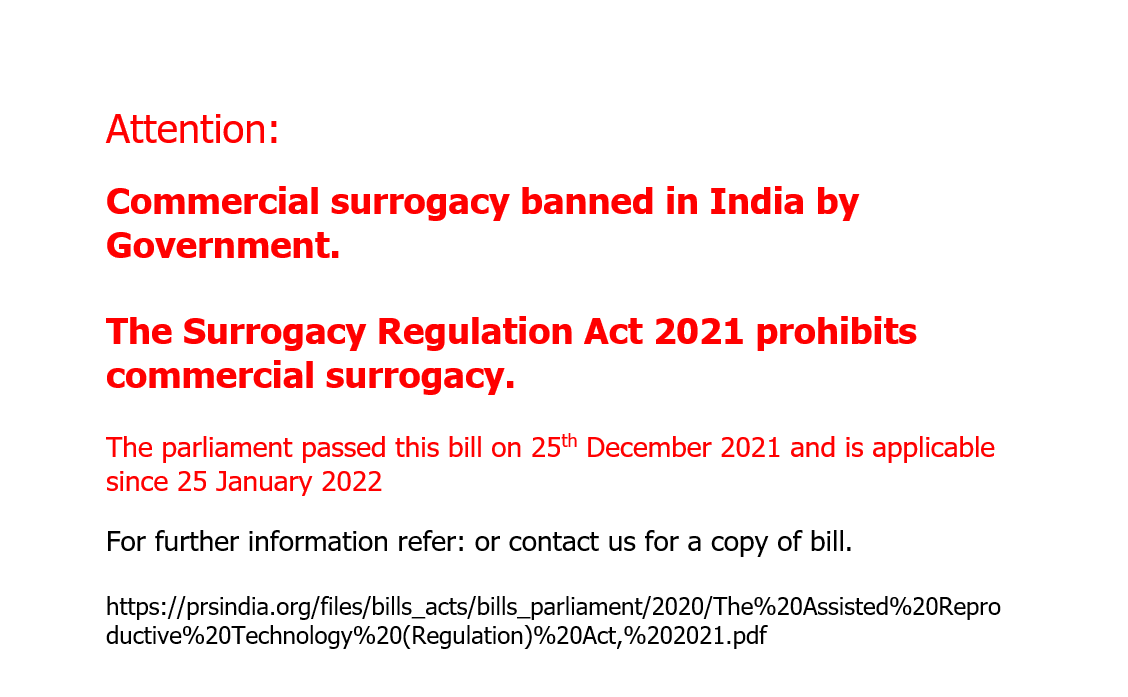Before starting the surrogacy process, intended parents should know about the legal issues related to surrogacy in India

The Indian Parliament approved legislation to better regulate fertility and surrogacy practices in the country and protect the health of the women involved. The Assisted Reproductive Technology (Regulation) Bill 2021 aims to maintain a standard of infrastructure, equipment, and personnel at fertility clinics. The Surrogacy (Regulation) Bill 2020 proposes increased health insurance coverage to 36 months, prohibits paid surrogacy, and allows divorced or widowed women to have children through surrogacy. Criticism of the bills highlights the lack of inclusion of single parents and LGBTQ+ communities.
Read more: https://prsindia.org/files/bills_acts/bills_parliament/2020/The%20Assisted%20Reproductive%20Technology%20(Regulation)%20Act,%202021.pdf
When should people go for surrogacy?
There are a variety of reasons why couples around the world might choose surrogacy. Here are a few reasons –
- Same-Sex Couple – Gay couples, especially men, will use surrogacy to have a child of their own by donating their sperm. They are taking the help of the eggs donated to have their own baby.
- Advanced age of the mother – In these situations where the age is higher, carrying the pregnancy is more dangerous because the infant may not be easier to bear.
- Repeated IVF failures – If the intended couple has tried to become pregnant several times using ART techniques like IVF but has failed miserably. So, in this case, the gestational surrogacy process might be a good option for the parents.
- Severe disease of the mother – If pregnancy is not easy for the mother or the unborn child due to some chronic diseases like heart disease and kidney diseases.
- Hysterectomy – If a mother has removed her uterus due to some medical issues or is born with a nonfunctional uterus, then surrogacy is the best option for that couple.
Types of Surrogacy
There are basically 2 types of surrogacy –
- Gestational surrogacy – In gestational surrogacy, the surrogate does not use her own egg. The egg used belongs to the intended mother or could choose an egg donor similarly, the sperm used belongs to the intended father or the sperm donor. The gestational carrier has no biological relationship with the child.
- Traditional surrogacy – In traditional surrogacy, the egg used, belong to the surrogate. Thus, having a biological relationship with the child.
Surrogacy in India: What you should know?
What was once a popular destination for internationally intended parents no longer became an option in 2015, when new regulations on the surrogacy process were passed by the Indian Government.
Today, Indian laws on surrogacy make the completion of surrogacy in India illegal for foreign intended parents. The only people today who can complete a commercial surrogacy in India are intended parents who are holding Indian passports and are married couples, with no clarity on single-parent surrogacy.
After a debate of almost two years, a new surrogacy draft bill for 2019 has been presented in both houses but has yet to pass and become law. Once passed in both houses and signed up by the Indian president, surrogacy laws stated below will be implemented.
- Commercial surrogacy has been banned in India since then.
- Surrogacy can only be practiced by the Indian couple thus banning foreign individuals from participating in the process of surrogacy. It only allows the married Indian couple to practice surrogacy stating that the couple should be married for at least five years. They are also required to have a written doctor’s letter stating that they are unable to conceive.
- A woman can be a surrogate only once, that too she must be a family member or a relative of the infertile couple. She is also required to have a child of her own.
- Single partners, homosexuals, and live-in relationships are banned from practicing surrogacy.
 Legal issues regarding surrogacy in India
Legal issues regarding surrogacy in India
It is difficult to identify exactly one reason why surrogacy in India has been banned for parents intended internationally, but it is easy to identify some of the reasons that legislators may have played a role in that decision.
Like all international surrogacy in less developed countries, there is less protection available for intended parents and surrogates — and it has led to harmful results for both. When Indian surrogacy first became a booming industry, no laws were in place, and due to this unsafe and unethical practices formed.
Apart from this, there were also many other legal complications regarding surrogacy in India.
- The exploitation of the Surrogate Mother– There have been instances where the surrogate mother is said to be at risk of sexual abuse, failing to pay compensation, illegally selling the ovum, etc. These claims have posed a threat to a technology that stands as a blessing for couples with serious infertility issues such as women who can not bring a pregnancy to term as it could prove fatal or simply impossible for them.
- Citizenship of newborn child – Many foreigners coming to India for the process of surrogacy face the issue of whether the child belonging to the foreign nationals will have the right to Indian citizenship or not.
- The Child’s Interest: The surrogacy process involves paying money to the surrogate mother for delivering the child and handing it over to the intended parents. It is thus considered by some as equal to buying and selling a child. It’s also argued that it would result in creating designer babies.
- Right to life – The only connection of the surrogate with the baby is that she is providing her womb. This should be made clear before anything else. If not, then she might claim the child as hers as well.
- Legal Contracts – In India, it is commonly criticized that surrogacy contracts are objected to public policy since they require a woman’s use of the uterus to conceive a child to be handed over to the intended parents. Commercial surrogacy might prohibit once the surrogacy draft bill 2019 is passed, but as of now Indian childless couples still have the option of surrogacy.
- Right to Equality – It is said that a citizen’s most important right is equality, which may be compromised during surrogacy. Through surrogacy, the right to raise the child through a contract is reserved for the intended parents even before proceedings begin. So those who support equal opportunity for the mother to raise the unborn child should be mindful that a contract is signed with the consent and approval of a surrogate and her counsel.
Read more on this topic:
Top 10 surrogacy doctors in India with affordable surrogacy cost
How much does surrogacy cost in India?
All you need to know about surrogacy in India?
Conclusion
If you consider surrogacy as an international intended parent in India. It is best to consider other locations to achieve your surrogacy goals in order to avoid legal ramifications.
Local Indian intended parents, need to get in touch with the best surrogacy clinics in India and seek the current status of surrogacy laws.
If you’d like to learn more about IVF, Egg Donation, or surrogacy in India, check out the rest of our website at IVF Conceptions. We offer legally secure and affordable surrogacy consulting services for FREE.


 Legal issues regarding surrogacy in India
Legal issues regarding surrogacy in India